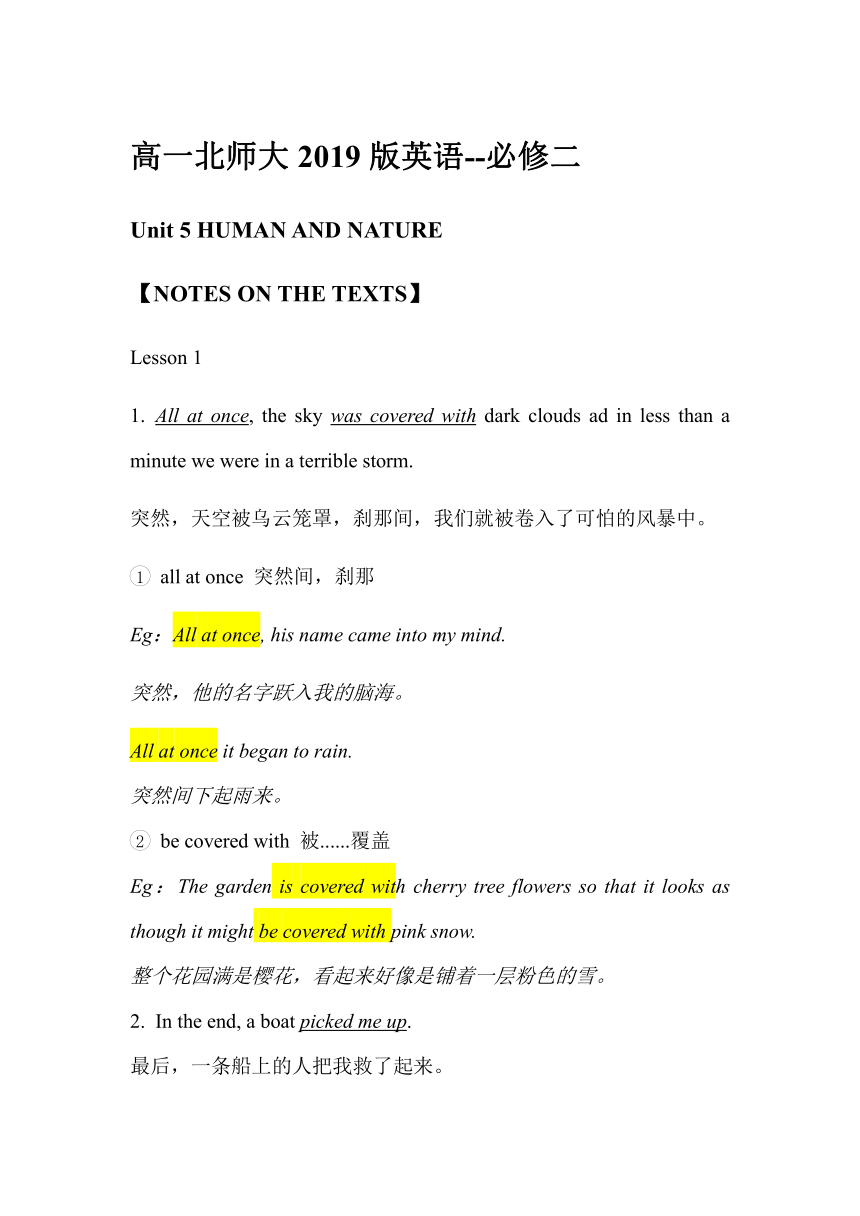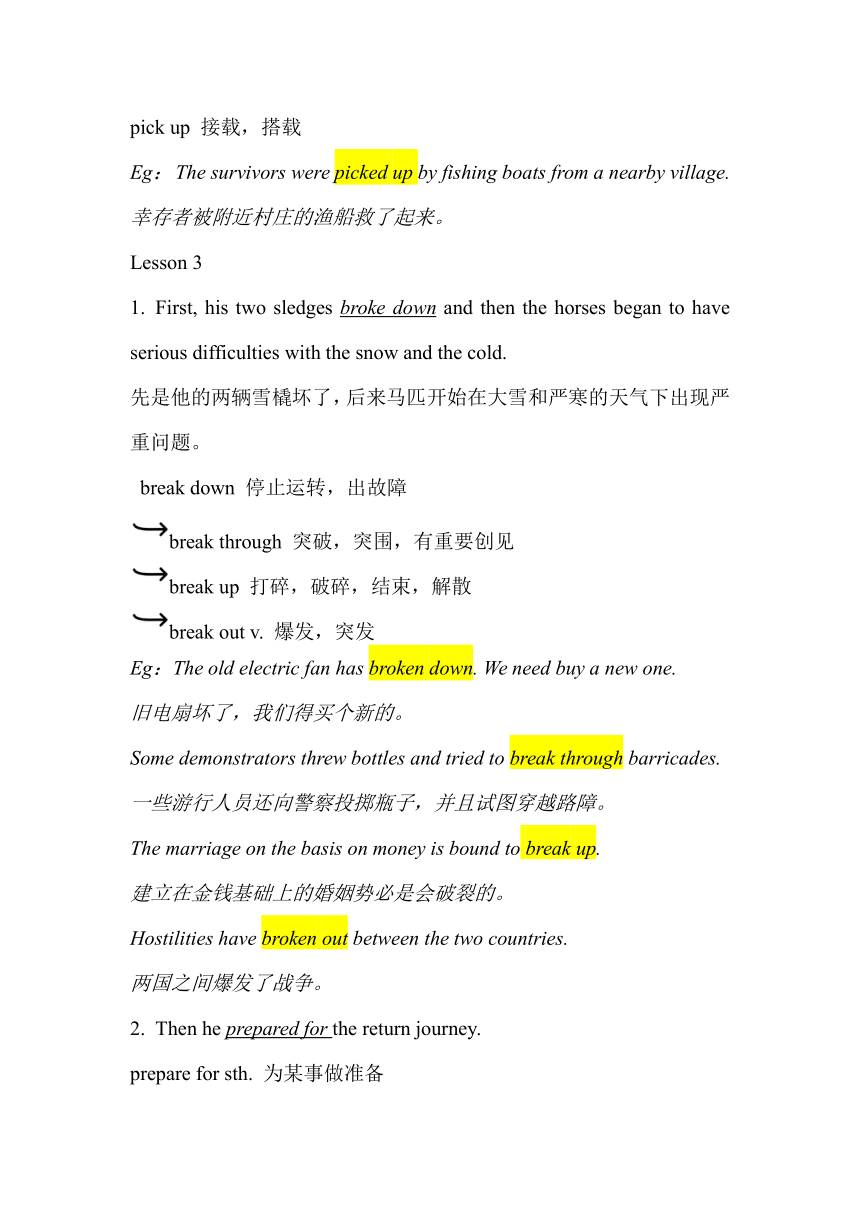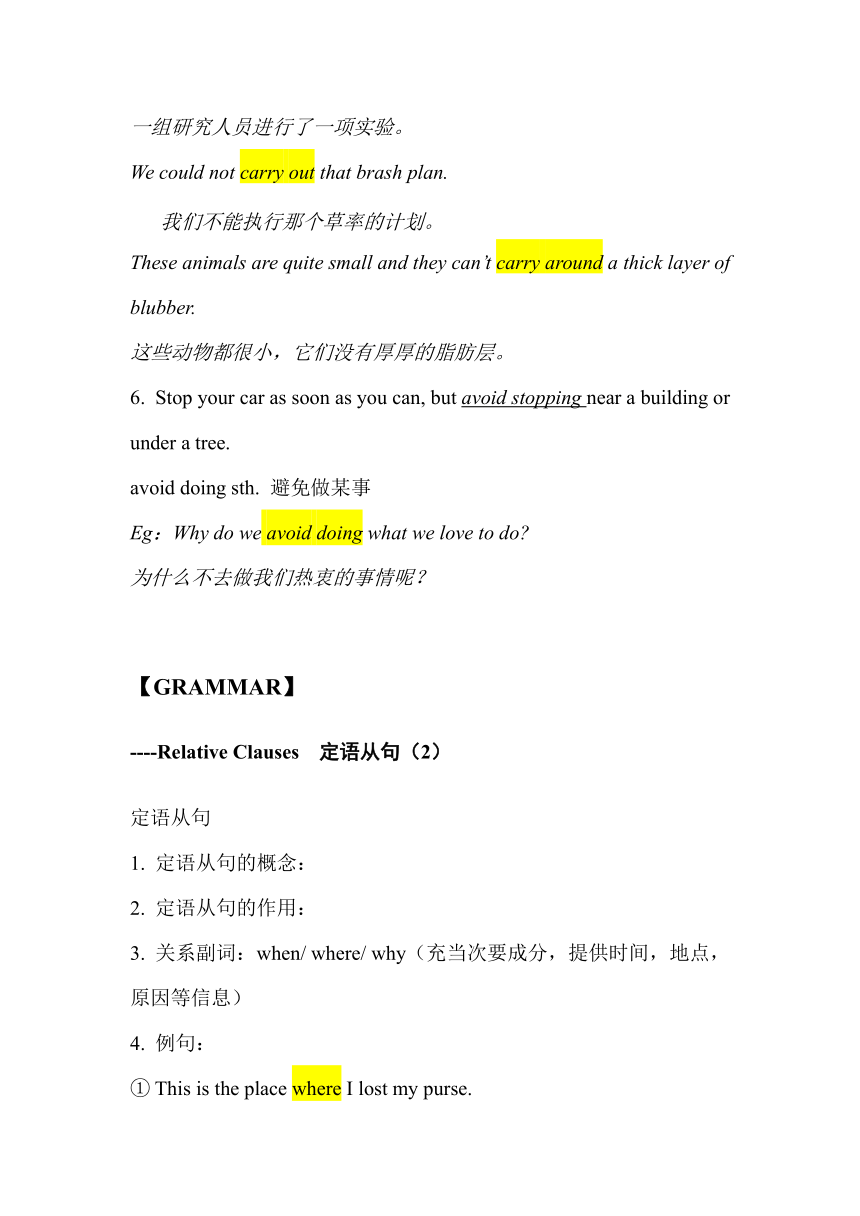北师大版(2019)高中英语必修第二册Unit 5 Humans and nature( 核心讲解+练习)学案word版(含答案)
文档属性
| 名称 | 北师大版(2019)高中英语必修第二册Unit 5 Humans and nature( 核心讲解+练习)学案word版(含答案) |  | |
| 格式 | docx | ||
| 文件大小 | 22.6KB | ||
| 资源类型 | 教案 | ||
| 版本资源 | 北师大版(2019) | ||
| 科目 | 英语 | ||
| 更新时间 | 2021-05-17 00:00:23 | ||
图片预览




文档简介
高一北师大2019版英语--必修二
Unit 5 HUMAN AND NATURE
【NOTES ON THE TEXTS】
Lesson 1
All at once, the sky was covered with dark clouds ad in less than a minute we were in a terrible storm.
突然,天空被乌云笼罩,刹那间,我们就被卷入了可怕的风暴中。
all at once 突然间,刹那
Eg:All at once, his name came into my mind.
突然,他的名字跃入我的脑海。
All at once it began to rain.
突然间下起雨来。
be covered with 被......覆盖
Eg:The garden is covered with cherry tree flowers so that it looks as though it might be covered with pink snow.
整个花园满是樱花,看起来好像是铺着一层粉色的雪。
In the end, a boat picked me up.
最后,一条船上的人把我救了起来。
pick up 接载,搭载
Eg: The survivors were picked up by fishing boats from a nearby village.
幸存者被附近村庄的渔船救了起来。
Lesson 3
First, his two sledges broke down and then the horses began to have serious difficulties with the snow and the cold.
先是他的两辆雪橇坏了,后来马匹开始在大雪和严寒的天气下出现严重问题。
break down 停止运转,出故障
break through 突破,突围,有重要创见
break up 打碎,破碎,结束,解散
break out v. 爆发,突发
Eg:The old electric fan has broken down. We need buy a new one.
旧电扇坏了,我们得买个新的。
Some demonstrators threw bottles and tried to break through barricades.
一些游行人员还向警察投掷瓶子,并且试图穿越路障。
The marriage on the basis on money is bound to break up.
建立在金钱基础上的婚姻势必是会破裂的。
Hostilities have broken out between the two countries.
两国之间爆发了战争。
Then he prepared for the return journey.
prepare for sth. 为某事做准备
Eg:It’s time to prepare for our final exam.
该准备期末考试了。
The team were soon very tired and were running out of food.
run out of === use up 用完,耗尽
Eg:They almost ran out of food and felt helpless.
食物快吃光了,他们感到很无助。
run out of steam vi. 失去势头,精疲力尽
Eg:But here he soon runs out of steam.
但是他很快就失去了活力。
Later, these rocks proved that at one time in the distant past, the continent of Antarctic was covered by plants.
后来,通过这石块可以证实,在遥远的过去,南极洲曾经被植被覆盖。
at one time 曾经有一个时期,一度
Eg:At one time he lived with his uncle. 他曾一度与叔叔住在一起。
Scott and two of his team members carried on and got within eleven miles of one of their food bases.
carry on 继续走,继续前进
Eg:She stopped and looked back, then carried on down the stairs.
她停下来往后看了看,又继续下楼。
carry out vt. 执行,实行,贯彻,实现,完成
carry around 随身携带
Eg:A team of researchers carried out an experiment.
一组研究人员进行了一项实验。
We could not carry out that brash plan.
我们不能执行那个草率的计划。
These animals are quite small and they can’t carry around a thick layer of blubber.
这些动物都很小,它们没有厚厚的脂肪层。
Stop your car as soon as you can, but avoid stopping near a building or under a tree.
avoid doing sth. 避免做某事
Eg:Why do we avoid doing what we love to do?
为什么不去做我们热衷的事情呢?
【GRAMMAR】
----Relative Clauses 定语从句(2)
定语从句
定语从句的概念:
定语从句的作用:
关系副词:when/ where/ why(充当次要成分,提供时间,地点,原因等信息)
例句:
① This is the place where I lost my purse.
②Marco Polo travelled to China, where there were inventions and developments at that time.
She still remembers the day when Bill first walked into her office.
I’ll never forget the day when I first met this great inventor.
Do you know the reason why he’s so anger with me?
Could you tell me the reason why you waste time going to the bank when you can do your banking online?
【注意】有时reason 后面的why 可以省略,或者使用that。
Eg: The reason (that) he’s coughing so badly is because of the smog.
【练习】
1.The place _______interested me most was the Children's Palace.
A. Which B. where C. what D. in which
2.Do you know the man _______?
A. whom I spoke B. to who spoke C. I spoke to D. that I spoke
3.This is the hotel _______last month.
A. which they stayed B. at that they stayed
C. where they stayed at D. where they stayed
4.Do you know the year ______the Chinese Communist Party was founded?
A. which B. that C. when D. on which
5.That is the day ______I'll never forget.
A. which B. on which C. in which D. when
6.The factory ______we'll visit next week is not far from here.
A. where B. to which C. which D. in which
7.Great changes have taken place in the factory ____we are working since then.
A. where B. that C. which D. there
8.This is one of the best films _______.
A. that have been shown this year B. that have shown
C. that has been shown this year D. that you talked
9.Can you lend me the book ______the other day?
A. about which you talked B. which you talked
C. about that you talked D. that you talked
10.The pen ______he is writing is mine.
A.with which B.in which C.on which D.by which
11.They arrived at a farmhouse, in front of ______sat a small boy.
A. whom B. who C. which D. that
12.The engineer ______my father works is about 50 years old.
A.to whom B.on whom C.with which D. with whom
13.It there anyone in your class ______family is in the country?
A. who B. who's C. which D. whose
14.I'm interested in ______you have said.
A. all that B.all what C. that D. which
15.I want to use the same dictionary ______was used yesterday.
A. which B. who C. what D. as
16.He isn't such a man ______he used to be.
A. who B. whom C. that D. as
17.He is good at English, ______we all know.
A. that B. as C. whom D. what
18.Li Ming, ______to the concert enjoyed it very much.
A. I went with B. with whom I went
C. with who I went D.I went with him
19.I don't like ______ as you read.
A. the novels B. the such novels
C. such novels D. same novels
20.He talked a lot about things and persons _______they remembered in the school.
A. which B. that C. whom D. what
21.The letter is from my sister, ______is working in Beijing .
A. which B. that C. whom D. who
22.In our factory there are 2,000 workers, two thirds of ____are women.
A. them B. which C. whom D. who
23.You're the only person ______I've ever met ______could do it.
A. who;/ B./; whom C. whom;/ D./; who
24.I lost a book, ______I can't remember now.
A. whose title B. its title C. the title of it D. the title of that
25.Last summer we visited the West Lake , ______Hangzhou is famous in the world.
A.for which B.for that C.in which D what
26.I have bought such a watch _______ was advertised on TV.
A. that B. which C. as D. it
27.I can never forget the day _______ we worked together and the day ______ we spent together.
A.when; which B.which; when C.what; that D.on which; when
28.The way ______he looks at problems is wrong.
A. which B. whose C. what D./
【参考答案】
1-5 ACDCA 6-10 CAAAA 11-15 CDDAD 16-20 DBBCB 21-25 DCDAA 26-28 CAD
Unit 5 HUMAN AND NATURE
【NOTES ON THE TEXTS】
Lesson 1
All at once, the sky was covered with dark clouds ad in less than a minute we were in a terrible storm.
突然,天空被乌云笼罩,刹那间,我们就被卷入了可怕的风暴中。
all at once 突然间,刹那
Eg:All at once, his name came into my mind.
突然,他的名字跃入我的脑海。
All at once it began to rain.
突然间下起雨来。
be covered with 被......覆盖
Eg:The garden is covered with cherry tree flowers so that it looks as though it might be covered with pink snow.
整个花园满是樱花,看起来好像是铺着一层粉色的雪。
In the end, a boat picked me up.
最后,一条船上的人把我救了起来。
pick up 接载,搭载
Eg: The survivors were picked up by fishing boats from a nearby village.
幸存者被附近村庄的渔船救了起来。
Lesson 3
First, his two sledges broke down and then the horses began to have serious difficulties with the snow and the cold.
先是他的两辆雪橇坏了,后来马匹开始在大雪和严寒的天气下出现严重问题。
break down 停止运转,出故障
break through 突破,突围,有重要创见
break up 打碎,破碎,结束,解散
break out v. 爆发,突发
Eg:The old electric fan has broken down. We need buy a new one.
旧电扇坏了,我们得买个新的。
Some demonstrators threw bottles and tried to break through barricades.
一些游行人员还向警察投掷瓶子,并且试图穿越路障。
The marriage on the basis on money is bound to break up.
建立在金钱基础上的婚姻势必是会破裂的。
Hostilities have broken out between the two countries.
两国之间爆发了战争。
Then he prepared for the return journey.
prepare for sth. 为某事做准备
Eg:It’s time to prepare for our final exam.
该准备期末考试了。
The team were soon very tired and were running out of food.
run out of === use up 用完,耗尽
Eg:They almost ran out of food and felt helpless.
食物快吃光了,他们感到很无助。
run out of steam vi. 失去势头,精疲力尽
Eg:But here he soon runs out of steam.
但是他很快就失去了活力。
Later, these rocks proved that at one time in the distant past, the continent of Antarctic was covered by plants.
后来,通过这石块可以证实,在遥远的过去,南极洲曾经被植被覆盖。
at one time 曾经有一个时期,一度
Eg:At one time he lived with his uncle. 他曾一度与叔叔住在一起。
Scott and two of his team members carried on and got within eleven miles of one of their food bases.
carry on 继续走,继续前进
Eg:She stopped and looked back, then carried on down the stairs.
她停下来往后看了看,又继续下楼。
carry out vt. 执行,实行,贯彻,实现,完成
carry around 随身携带
Eg:A team of researchers carried out an experiment.
一组研究人员进行了一项实验。
We could not carry out that brash plan.
我们不能执行那个草率的计划。
These animals are quite small and they can’t carry around a thick layer of blubber.
这些动物都很小,它们没有厚厚的脂肪层。
Stop your car as soon as you can, but avoid stopping near a building or under a tree.
avoid doing sth. 避免做某事
Eg:Why do we avoid doing what we love to do?
为什么不去做我们热衷的事情呢?
【GRAMMAR】
----Relative Clauses 定语从句(2)
定语从句
定语从句的概念:
定语从句的作用:
关系副词:when/ where/ why(充当次要成分,提供时间,地点,原因等信息)
例句:
① This is the place where I lost my purse.
②Marco Polo travelled to China, where there were inventions and developments at that time.
She still remembers the day when Bill first walked into her office.
I’ll never forget the day when I first met this great inventor.
Do you know the reason why he’s so anger with me?
Could you tell me the reason why you waste time going to the bank when you can do your banking online?
【注意】有时reason 后面的why 可以省略,或者使用that。
Eg: The reason (that) he’s coughing so badly is because of the smog.
【练习】
1.The place _______interested me most was the Children's Palace.
A. Which B. where C. what D. in which
2.Do you know the man _______?
A. whom I spoke B. to who spoke C. I spoke to D. that I spoke
3.This is the hotel _______last month.
A. which they stayed B. at that they stayed
C. where they stayed at D. where they stayed
4.Do you know the year ______the Chinese Communist Party was founded?
A. which B. that C. when D. on which
5.That is the day ______I'll never forget.
A. which B. on which C. in which D. when
6.The factory ______we'll visit next week is not far from here.
A. where B. to which C. which D. in which
7.Great changes have taken place in the factory ____we are working since then.
A. where B. that C. which D. there
8.This is one of the best films _______.
A. that have been shown this year B. that have shown
C. that has been shown this year D. that you talked
9.Can you lend me the book ______the other day?
A. about which you talked B. which you talked
C. about that you talked D. that you talked
10.The pen ______he is writing is mine.
A.with which B.in which C.on which D.by which
11.They arrived at a farmhouse, in front of ______sat a small boy.
A. whom B. who C. which D. that
12.The engineer ______my father works is about 50 years old.
A.to whom B.on whom C.with which D. with whom
13.It there anyone in your class ______family is in the country?
A. who B. who's C. which D. whose
14.I'm interested in ______you have said.
A. all that B.all what C. that D. which
15.I want to use the same dictionary ______was used yesterday.
A. which B. who C. what D. as
16.He isn't such a man ______he used to be.
A. who B. whom C. that D. as
17.He is good at English, ______we all know.
A. that B. as C. whom D. what
18.Li Ming, ______to the concert enjoyed it very much.
A. I went with B. with whom I went
C. with who I went D.I went with him
19.I don't like ______ as you read.
A. the novels B. the such novels
C. such novels D. same novels
20.He talked a lot about things and persons _______they remembered in the school.
A. which B. that C. whom D. what
21.The letter is from my sister, ______is working in Beijing .
A. which B. that C. whom D. who
22.In our factory there are 2,000 workers, two thirds of ____are women.
A. them B. which C. whom D. who
23.You're the only person ______I've ever met ______could do it.
A. who;/ B./; whom C. whom;/ D./; who
24.I lost a book, ______I can't remember now.
A. whose title B. its title C. the title of it D. the title of that
25.Last summer we visited the West Lake , ______Hangzhou is famous in the world.
A.for which B.for that C.in which D what
26.I have bought such a watch _______ was advertised on TV.
A. that B. which C. as D. it
27.I can never forget the day _______ we worked together and the day ______ we spent together.
A.when; which B.which; when C.what; that D.on which; when
28.The way ______he looks at problems is wrong.
A. which B. whose C. what D./
【参考答案】
1-5 ACDCA 6-10 CAAAA 11-15 CDDAD 16-20 DBBCB 21-25 DCDAA 26-28 CAD
同课章节目录
- Unit 4 Information technology
- Lesson 1 Avatars
- Lesson 2 Apps
- Lesson 3 Internet and Friendships
- Unit 5 Humans and nature
- Lesson 1 A Sea Story
- Lesson 2 Professional Rescue Team
- Lesson 3 Race to the Pole
- Unit 6 The admirable
- Lesson 1 A Medical Pioneer
- Lesson 2 History Makers
- Lesson 3 The Superhero Behind Superman
